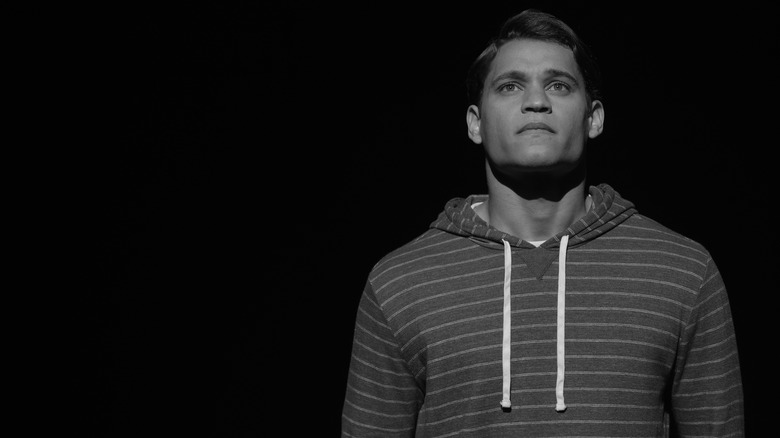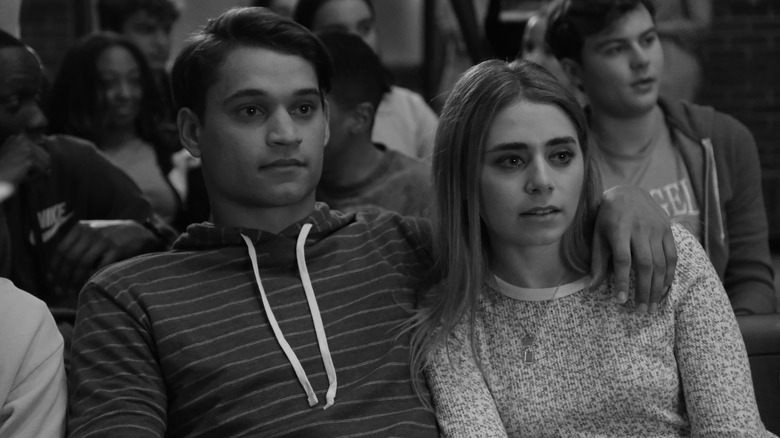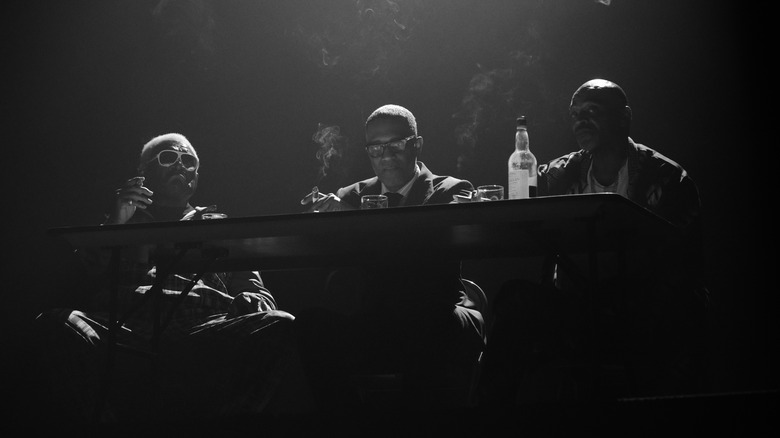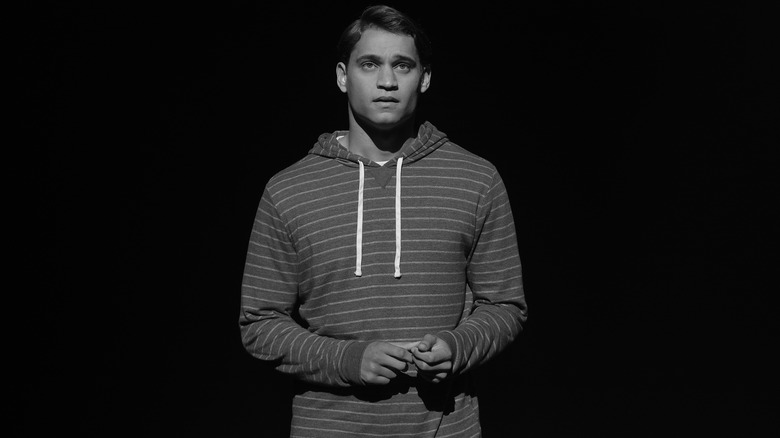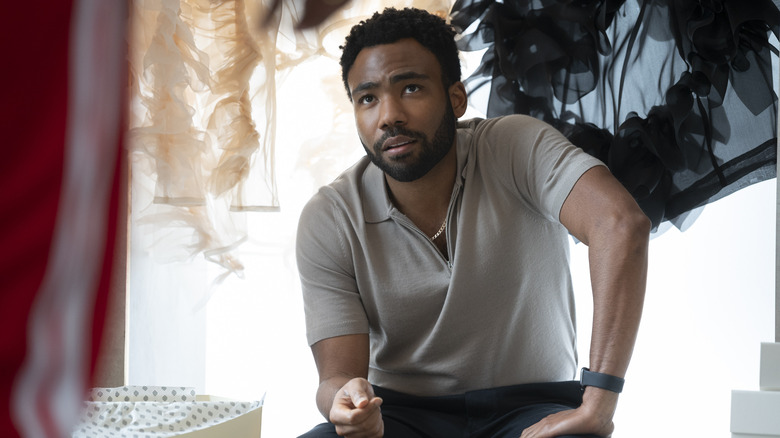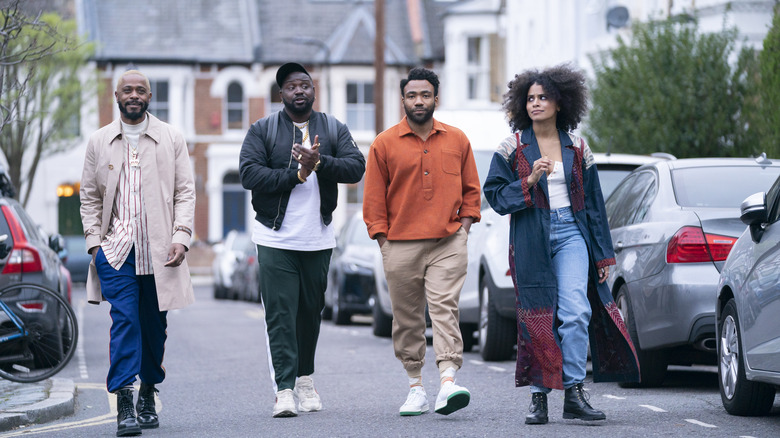Atlanta Season 3, Episode 9 Is A Mixed Bag Of Disappointment
The latest episode of "Atlanta" is almost good. It has some intriguing and even funny moments, but it ultimately suffers from the same toothlessness and self-sabotage that has plagued the entire season. Shown in literal black and white, "Rich Wigga, Poor Wigga" is an obvious nod to the film "Imitation of Life" that attempts to tackle the concept of "gatekeeping Blackness" and does so with mixed success. Let's just get right into breaking down the episode, and explaining why both this episode and season 3 as a whole have routinely fallen short (to me, as a Black person) despite some promising moments.
Aaron's Imitation of Life
The episode begins with a seemingly white young man playing a video game called "Flame Thrower 2." After receiving a text from his girlfriend who has been accepted into college, he quickly becomes upset and takes his anger out on the Black guys he's playing with, dropping a hard "r" and making monkey noises while telling them to eat bananas. We quickly learn that Aaron (Tyriq Withers), the young man in question, is actually a white-passing Black teenager who is being raised by his unambiguously Black father. Aaron has been passing for white at school, and his own friends and girlfriend don't even realize this fact about him. During the conversation that occurs between Aaron and his father on the way to school, we learn that Aaron was hoping to get into the same college as his girlfriend, but simply can't afford to go because his dad doesn't have the money and isn't keen on cosigning any loans. It's obvious that his dad is loving, but he really sucks in terms of supporting Aaron's educational aspirations. On top of that, he informs Aaron that he's going to have to start paying rent if he wants to continue living in his childhood home after high school graduation, shortly after telling Aaron he needs to save money to put himself through college. I know this is a reality for many people, but I wish that "Atlanta" would, just once, drop this pervasive trope of the abrasive and unreasonable Black parent.
Gatekeeping Blackness, literally
At school, it is announced that full-ride college scholarships are being offered exclusively to Black students, courtesy of a Black businessman named Robert S. Lee, who is played by the recently deceased and controversial YouTuber, Kevin Samuels, who made a career of being an unabashed misogynist with a special hatred for Black women.
Obviously, the scholarship could have been the answer to the prayers of the episode's white-passing protagonist if he hadn't spent so much of his time pretending not to be Black, and now he faces a dilemma because he can't take advantage of the scholarship he desperately needs without outing himself as a Black person. He decides to bite the bullet and see about the scholarship, only to learn that the powers that be aren't just using phenotype and ancestry to determine who or isn't Black, but that they are relying on the individual's connections to Black American culture to determine eligibility. This leads to Aaron standing before a council of older Black men and having to, quite literally, perform Blackness before them. Specifically, he's being forced to perform Blackness according to laughably narrow standards, and I understand that entirely, but again — the show itself routinely relegates certain Black people (you know, women) to the same narrow, racist standards the episode attempts to critique. It's just less powerful in that way, but I digress.
The council decides that Aaron is not Black, and so there's no scholarship for him. As a result, Aaron decides to retaliate by crafting a flamethrower and attempting to burn down the school. That night, he meets a Nigerian student who was also denied a scholarship despite being Black. Aaron tells him that Nigerians aren't really Black because they have a distinct culture and know where they came from — which implies, incorrectly, that Black Americans do not have their own culture. The student counters by telling him that it makes no difference where he's from because he still reads as Black to everyone around him, and faces discrimination as a Black person in America. Aaron cracks a joke about the other student's darker skin tone, and they argue about who will get to burn down the school, resulting in them attempting to burn each other. The Nigerian student manages to burn Aaron's shoes before he is non-fatally shot by police officers.
The passing days are over
The wounded Nigerian student is awarded a scholarship because, apparently, getting shot by the police while unarmed is the "Blackest" thing there is. Meanwhile, Aaron is arrested, though unharmed. We flashforward sometime in the future to see that Aaron has dropped his "Imitation of Life" stint and is working at a mobile phone store. When we see him, he has embraced a stereotypically Black aesthetic and is hitting on a Black girl customer at his job. Kate, his white ex-girlfriend, appears and is visibly shocked by Aaron's transformation. The two exchange pleasantries and Aaron tells Kate that he's more attracted to her now than he's ever been. As she becomes flustered, he turns to smirk at the camera, and the credits roll.
Inspired by Glover's own relationship with Blackness?
It's worth mentioning that this episode of "Atlanta" was both written and directed by Donald Glover himself. Knowing this, I got the impression that this episode is at least partially inspired by Glover's experiences as the "weird" Black kid growing up, and I don't necessarily think that's a bad thing. Been there, done that. It's not an offense in and of itself, but some of us navigate and process that by becoming better people, and some of us become weirdly anti-Black and pretentious, desperate to appeal to white people while being completely blind to this unfortunate fact. I'm not saying Glover is the latter, but I am saying that it's interesting how the "Atlanta" fandom subreddit is mostly white and populated by guys like Socks who have pretty much deified Glover and are taking away some concerning messages from the show, thinking it's a definitive take on Black culture and race relations. The issue is that no single Black person or "Black" show is the definitive point of reference when it comes to something as complex as Blackness and racism in America. However, I have pointed out in many of my reviews that the show's attempts to speak on these topics have been notably and repeatedly undermined by its own anti-Blackness. This episode is no different. I wish I felt more comfortable or welcome to enjoy his art but it always feels like Black women are a joke, an enemy, an afterthought, a punchline, in the universe he has created. I mean, just look at the description for this episode: "Black and White episode? Yawn. Emmy Bait. Why do they hate black women so much?"
Like many of the official "Atlanta" episode blurbs, it's an attempt to preemptively undermine both past and potential criticism — valid or otherwise — and it comes off as incredibly childish. It's a shame. Glover is a talented guy, but maybe he'd benefit from listening to valid critiques or having other people interview him rather than thinking that manufacturing outrage or being intentionally offensive just to get people talking is the same thing as making good and meaningful art.
Why this episode (and season 3) ultimately kinda sucks
The show's interpretation of Blackness is limited in the same way that the episode is attempting to critique other people's myopic definitions of what it means to be Black, and it shows. By the episode's end, Aaron is "acting Black" in a way he wasn't before, and so he declares that he's "never been more attracted" to his white ex-girlfriend. This is exactly what I'm talking about when I say that "Atlanta"'s attempts to say anything truly meaningful about race are undermined by the writers' inability to really stick the landing or commit to it by forcing in uncomfortable and offensive stereotypes about Black people, in what looks like an attempt to make sure white viewership isn't completely alienated. It just doesn't come off as particularly funny or humorous to reinforce a harmful and damaging stereotype about Black men being hopelessly obsessed with white women when you consider the horrifying origin of it all. All things considered, the episode would have been better off without it. It's somewhere in the same category as the Chet Hanks and Liam Neeson cameos in "Trini 2 De Bone" and "New Jazz," respectively. I know there are people who are easily impressed by shock factor and what they perceive to be "boldness," but allow me to point at the reality of the situation.
A show created and run by Donald Glover, a Black man who has a documented history of relying on internalized anti-Blackness and racialized self-deprecation in his stand-up, music, and other artistic endeavors, went out of its way to feature two white men who have been involved in controversial acts of racism — unapologetic cultural appropriation and fetishism in Hanks' case, and wanting to commit hate crimes against any Black man he saw based on the actions of one disgusting individual in the case of Liam Neeson. "Atlanta" could have used the "standalone" episodes to highlight up-and-coming Black actors and talent in its third season, but chose to focus on white people and put more money into the pockets of privileged white men who have been publicly and notably racist in the process. Is some of it shocking? Sure. Does it spark conversation? Obviously. But it's not clever, and certainly not a substitute for good writing and storytelling. I'm not discounting the fact that Neeson could genuinely be sorry, but his sincerity in apologizing is not the point here, and a few little quips about the nature of white privilege don't really make up for the fact that a show that was initially well-liked for its predominantly Black cast and surrealistic stories that resonated with Black viewers has become kind of a disappointing mess for those of us keen enough to see it or care.
It just makes no sense that, four years after season 2, we've hardly seen the Black characters we've come to love. The show has morphed into a half-assed attempt at an anthology about white privilege that doesn't even have the balls to really go there because it continues and has dedicated four episodes in a 10-episode season to showcasing white actors and white perspectives. Forgive me if I don't f*** with it anymore because it feels like a convoluted minstrel show at this point, and so the praise it is receiving for being "deep" is nauseating and laughable. Whatever your feelings about "Atlanta," there's just one episode left in season 3. I've already seen it. It also kinda sucks, and I'll tell you why next week.
